Vauxhall Astra vs Suzuki Vitara – Which car suits you better?
Two cars, one duel: Vauxhall Astra meets Suzuki Vitara.
Which one wins in performance, efficiency and value for money? Find out now!
Costs and Efficiency:
Price and efficiency are often the first things buyers look at. Here it becomes clear which model has the long-term edge – whether at the pump, the plug, or in purchase price.
Suzuki Vitara has a hardly perceptible advantage in terms of price – it starts at 23600 £, while the Vauxhall Astra costs 25200 £. That’s a price difference of around 1620 £.
Fuel consumption also shows a difference: Vauxhall Astra manages with 2.20 L and is therefore decisively more efficient than the Suzuki Vitara with 5 L. The difference is about 2.80 L per 100 km.
Engine and Performance:
Under the bonnet, it becomes clear which model is tuned for sportiness and which one takes the lead when you hit the accelerator.
When it comes to engine power, the Vauxhall Astra has a significantly edge – offering 225 HP compared to 129 HP. That’s roughly 96 HP more horsepower.
In acceleration from 0 to 100 km/h, the Vauxhall Astra is clearly perceptible quicker – completing the sprint in 7.50 s, while the Suzuki Vitara takes 9.50 s. That’s about 2 s faster.
In terms of top speed, the Vauxhall Astra performs somewhat better – reaching 235 km/h, while the Suzuki Vitara tops out at 190 km/h. The difference is around 45 km/h.
There’s also a difference in torque: Vauxhall Astra pulls clearly perceptible stronger with 360 Nm compared to 235 Nm. That’s about 125 Nm difference.
Space and Everyday Use:
Beyond pure performance, interior space and usability matter most in daily life. This is where you see which car is more practical and versatile.
Both vehicles offer seating for 5 people.
In curb weight, Suzuki Vitara is slight lighter – 1255 kg compared to 1341 kg. The difference is around 86 kg.
In terms of boot space, the Vauxhall Astra offers slightly more room – 422 L compared to 375 L. That’s a difference of about 47 L.
In maximum load capacity, the Vauxhall Astra performs somewhat better – up to 1339 L, which is about 219 L more than the Suzuki Vitara.
When it comes to payload, Vauxhall Astra noticeable takes the win – 509 kg compared to 395 kg. That’s a difference of about 114 kg.
Who comes out on top?
Overall, the Vauxhall Astra shows itself to be outperforms in nearly all aspects and secures the title of DriveDuel Champion.
It convinces with the more balanced overall package and proves to be the more versatile choice for everyday use.
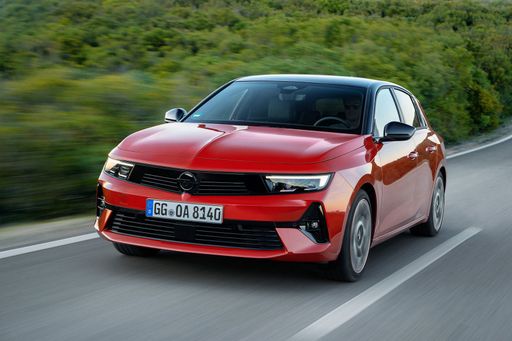
Vauxhall Astra
Vauxhall Astra
The Opel Astra exudes a sleek and modern design, making it a standout choice in the compact car segment. Its interior is thoughtfully crafted, providing both comfort and cutting-edge technology for an enhanced driving experience. The vehicle is also celebrated for its efficient performance, adeptly balancing power with fuel economy to suit urban and long-distance journeys alike.
details @ www.media.stellantis.com
@ www.media.stellantis.com
 @ www.media.stellantis.com
@ www.media.stellantis.com
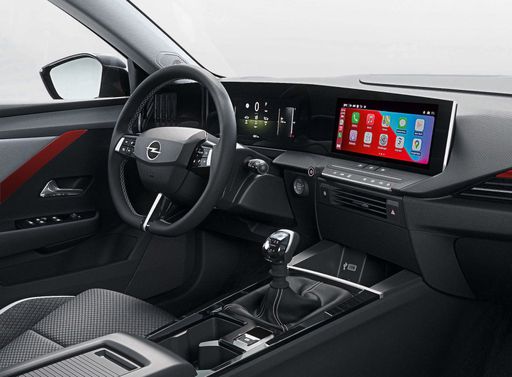 @ www.media.stellantis.com
@ www.media.stellantis.com
Suzuki Vitara
The Suzuki Vitara impresses with its compact design and robust stance, making it ideal for both urban and off-road adventures. Its sleek lines and modern aesthetics ensure it stands out on the road, complemented by a comfortable and high-tech interior. The Vitara offers a smooth and engaging driving experience, combining efficiency with practicality.
details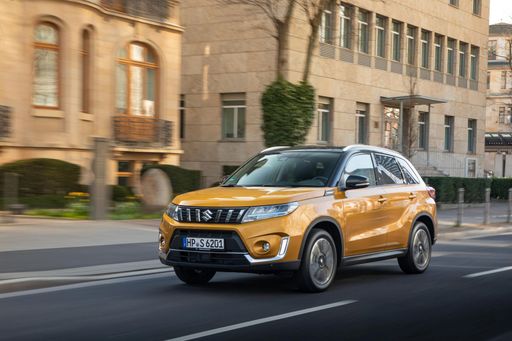 @ Suzuki
@ Suzuki
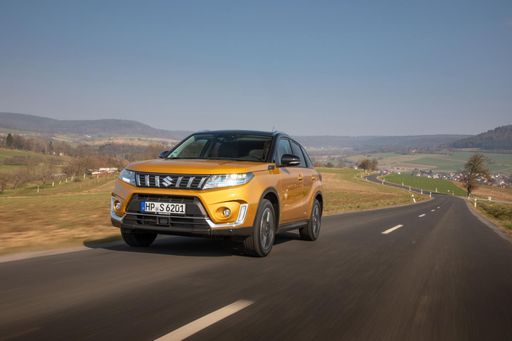 @ Suzuki
@ Suzuki
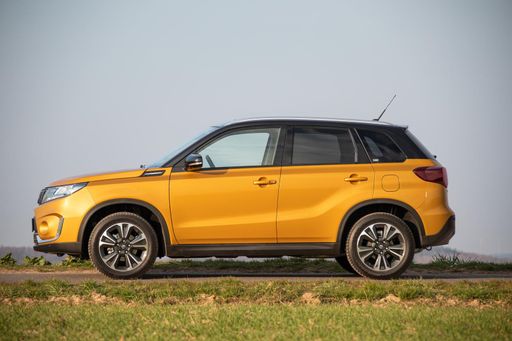 @ Suzuki
@ Suzuki
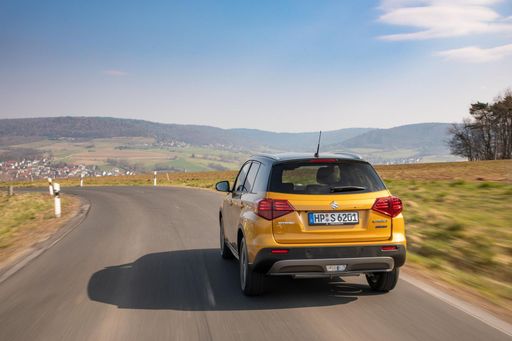 @ Suzuki
@ Suzuki
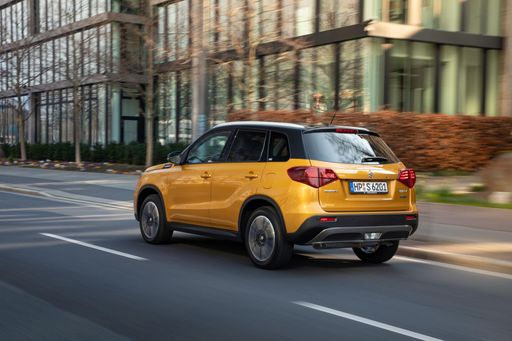 @ Suzuki
@ Suzuki
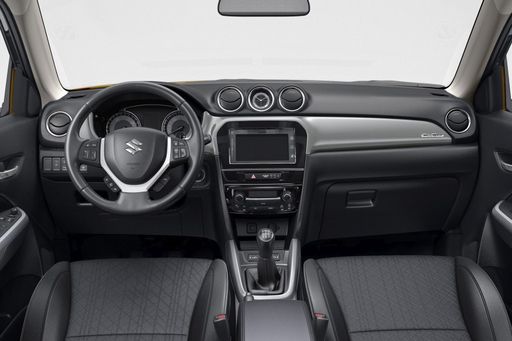 @ Suzuki
@ Suzuki

|

|
|
|
|
Costs and Consumption |
|
|---|---|
|
Price
25200 - 40500 £
|
Price
23600 - 30900 £
|
|
Consumption L/100km
2.2 - 6 L
|
Consumption L/100km
5 - 5.6 L
|
|
Consumption kWh/100km
15.40 kWh
|
Consumption kWh/100km
-
|
|
Electric Range
82 - 419 km
|
Electric Range
-
|
|
Battery Capacity
51 kWh
|
Battery Capacity
-
|
|
co2
0 - 135 g/km
|
co2
113 - 129 g/km
|
|
Fuel tank capacity
42 - 52 L
|
Fuel tank capacity
47 L
|
Dimensions and Body |
|
|---|---|
|
Body Type
Hatchback
|
Body Type
SUV
|
|
Seats
5
|
Seats
5
|
|
Doors
5
|
Doors
5
|
|
Curb weight
1341 - 1736 kg
|
Curb weight
1255 - 1395 kg
|
|
Trunk capacity
352 - 422 L
|
Trunk capacity
289 - 375 L
|
|
Length
4374 mm
|
Length
4185 mm
|
|
Width
1860 mm
|
Width
1775 mm
|
|
Height
1432 - 1488 mm
|
Height
1595 mm
|
|
Max trunk capacity
1268 - 1339 L
|
Max trunk capacity
1046 - 1120 L
|
|
Payload
414 - 509 kg
|
Payload
375 - 395 kg
|
Engine and Performance |
|
|---|---|
|
Engine Type
Petrol, Diesel, Electric, Petrol MHEV, Plugin Hybrid
|
Engine Type
Petrol MHEV, Full Hybrid
|
|
Transmission
Manuel, Automatic
|
Transmission
Manuel, Automatic
|
|
Transmission Detail
Manual Gearbox, Automatic Gearbox, Reduction Gearbox, Dual-Clutch Automatic
|
Transmission Detail
Manual Gearbox, Automated Manual
|
|
Drive Type
Front-Wheel Drive
|
Drive Type
Front-Wheel Drive, All-Wheel Drive
|
|
Power HP
130 - 225 HP
|
Power HP
116 - 129 HP
|
|
Acceleration 0-100km/h
7.5 - 10.6 s
|
Acceleration 0-100km/h
9.5 - 12.7 s
|
|
Max Speed
170 - 235 km/h
|
Max Speed
180 - 190 km/h
|
|
Torque
230 - 360 Nm
|
Torque
235 Nm
|
|
Number of Cylinders
3 - 4
|
Number of Cylinders
4
|
|
Power kW
96 - 165 kW
|
Power kW
85 - 95 kW
|
|
Engine capacity
1199 - 1598 cm3
|
Engine capacity
1373 - 1462 cm3
|
General |
|
|---|---|
|
Model Year
2023 - 2025
|
Model Year
2024
|
|
CO2 Efficiency Class
D, A, C, B
|
CO2 Efficiency Class
D, C
|
|
Brand
Vauxhall
|
Brand
Suzuki
|
What drive types are available for the Vauxhall Astra?
Available configurations include Front-Wheel Drive.
The prices and data displayed are estimates based on German list prices and may vary by country. This information is not legally binding.
